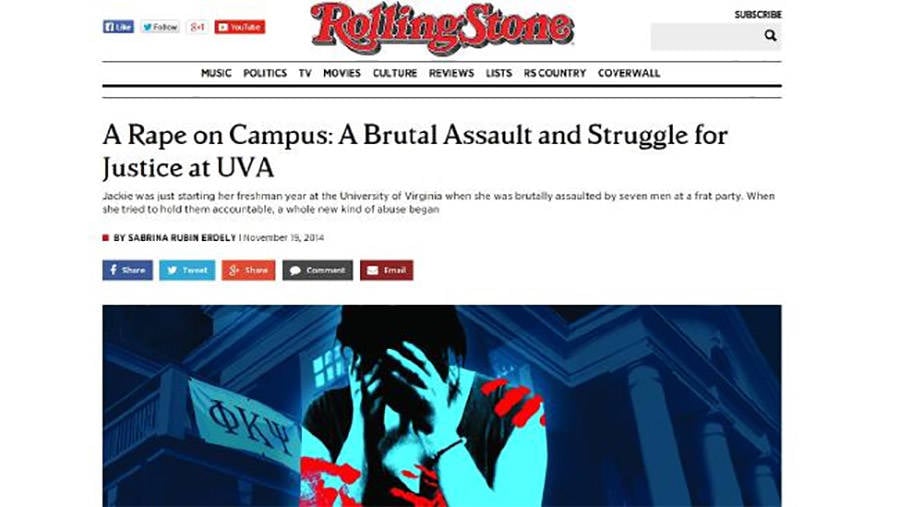Media Lies: Rolling Stone Fabricates A Gang Rape

YouTube
“A Rape on Campus: A Brutal Assault and Struggle for Justice at UVA,” published by Rolling Stone on November 19, 2014.
Fake news has real consequences. In the November 19, 2014, issue of Rolling Stone, reporter Sabrina Rubin Erdely published a 9,000-word feature article, complete with haunting artwork, called “A Rape on Campus.”
The story purported to be that of a female student at the University of Virginia, identified only as “Jackie,” who claimed that she had been brutally gang-raped by several college men as part of a fraternity initiation. Jackie said that she reported the incident to campus administrators, whom she said treated her like a suspect and took no action. The article didn’t include any quotes from the accused, nor were any of Jackie’s claims investigated.
If Rolling Stone had made a few phone calls, some odd facts would have come to light.
For one, the fraternity in question, which allegedly included rape as an initiation rite, wasn’t accepting new pledges at the time. For another, the party that Jackie claimed to have been picked up from never happened, and the individual that she named as her primary attacker didn’t attend her school and couldn’t be identified, despite Jackie’s insistence that she knew him well and had dated him for some time.
Once the story hit newsstands, the consequences were dire. The University of Virginia launched an investigation into the claims that it had, effectively, suborned rape. Area police launched their own investigation, conducting interviews and gathering information with an eye toward potential future prosecutions of those involved.
Mobs of outraged UVA students descended on the Phi Kappa Psi house, where the rape had allegedly happened, and chanted threatening slogans. The house was repeatedly vandalized, and members of the fraternity were subjected to threats of death and physical harm.
Several members of the frat found it necessary to hire lawyers, and the national organization suspended the UVA chapter indefinitely.
However, the writer responsible for all of this, Sabrina Rubin Erdely, later admitted to having gone in search of a campus rape story to sell Rolling Stone. As a condition of getting Jackie’s story, she had agreed not to fact-check what she was told.
With these revelations tumbling out in the wake of the scandal, and with the university and police investigators saying that the story had no discernible truth in it, the truth about the story’s fabrications came out.
Members of the Phi Kappa Psi fraternity sued Erdely and Rolling Stone who would pay a settlement of $3 million in damages.
Enjoy this article on media lies? Investigate whether or not the newspapers made up Jack The Ripper simply to sell more copies. Then, read about how fake news led to the flour riot of 1837.






